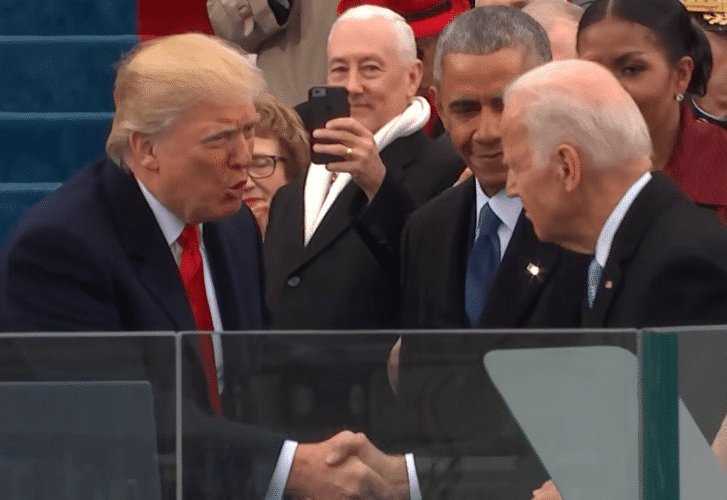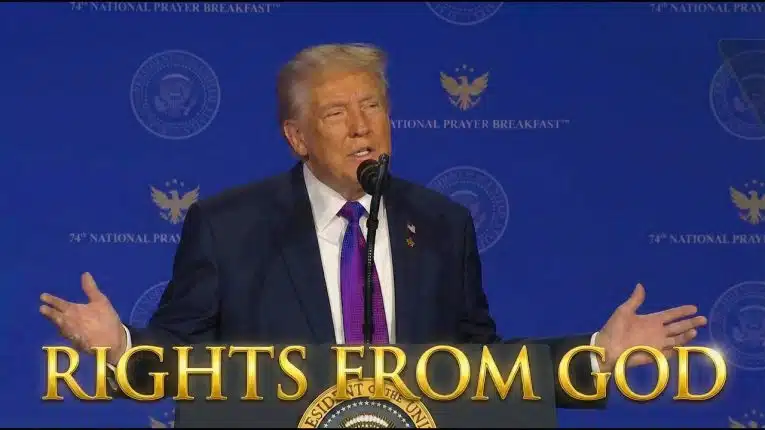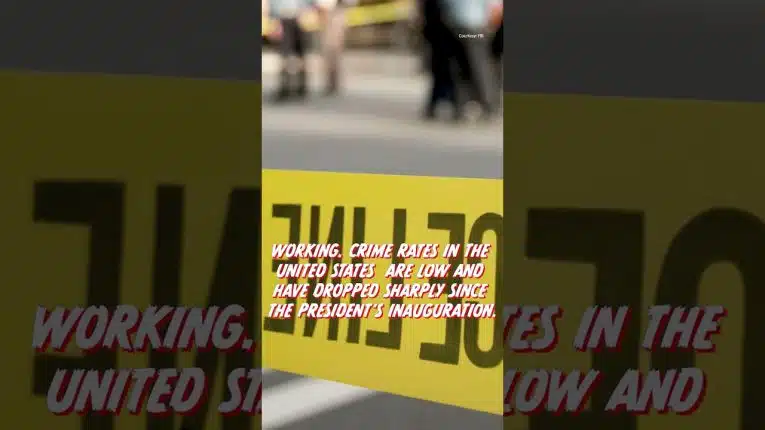
“[U]nder established Department principles, we decline criminal charges against Mr. Biden relating to the classified Afghanistan documents and his classified notebooks… We would do so even if we were not bound by the Office of Legal Counsel’s legal conclusion that a sitting president may not be charged with federal crimes.”
That was Special Counsel Robert Hur concluding in his Feb. 5, 2024 report on President Joe Biden’s retention of classified materials from his time as a Senator and then Vice President and reminding the American people that the Justice Department has no constitutional authority to prosecute a sitting president who is the unitary executive under Article II and cannot prosecute himself.
Biden not being prosecuted was always going to be the case, no matter what the outcome of Hur’s investigation into Biden was.
As with all other sitting presidents, the Justice Department’s Office of Legal Counsel has repeatedly concluded in both 2000 and 1973 they cannot be prosecuted, with the 2000 memo stating “We believe that the conclusion reached by the Department in 1973 still represents the best interpretation of the Constitution.”
So why have special counsels? Politics.
In this case, the role of Special Counsel Hur was to simultaneously provide a sort of assurance if not immunity to Biden that he would neither be prosecuted as president nor as a former president should he step down as president this year or simply not seek reelection.
To help that along, Hur also has caused a political firestorm by disclosing his views on Biden’s mental capacity to competently stand trial by stating “We have also considered that, at trial, Mr. Eiden would likely present himself to a jury, as he did during our interview of him, as a sympathetic, well-meaning, elderly man with a poor memory.”
This has already, predictably, led to questions mostly from Republicans supporting former President Donald Trump who is running against Biden in the 2024 election, that if Biden is not mentally competent to stand trial, how can he continue to competently serve as president?
And it is leading to calls for Biden to step aside for the good if not the country then the Democratic Party’s 2024 prospects. After the Special Counsel report dropped on Feb. 8, at a press conference one reporter asked Biden, “How bad is your memory and can you continue as president?”
Biden, visibly angry at the line of questioning and these provisions of the Special Counsel report, responded, “My memory is so bad I let you speak.”
When pressed again about his competence, Biden snapped back, declaring, “I am well-meaning. And I’m an elderly man. And I know what the hell I’m doing. I’ve been president — I put this country back on its feet. I don’t need his recommendation.”
Biden’s annoyance is understandable: The level of political interference by the Special Counsel and the Justice Department more broadly the past decade has been unprecedented, if not ultimately predictable.
In fact, the last four prospective and actual presidents have all had classified documents cases brought against them including Joe Biden, Donald Trump, Hillary Clinton and David Petraeus.
In 2011, the Guardian ran a headline about former CIA Director and retired Gen. David Petraeus, “Petraeus in profile: the man who could be president,” that speculated he might run for President in 2016 as a Republican candidate.
But it was not to be. A year later, after the terrorist attacks at the U.S. consulate in Benghazi, Libya on Sept. 11, 2012, it was revealed that Petraeus had an extramarital affair with his biographer beginning in 2011 who exchanged messages in a draft folder using Petraeus’ secure email account. When discovered, Petraeus resigned as CIA Director in Nov. 2012 and later pled guilty to a misdemeanor charge of mishandling classified information, ending Petraeus’ career before it ever began.
In 2014, it was discovered that Hillary Clinton was using her private email server at her home to route classified emails to her smartphone as a matter of convenience, leading to Congressional and State Department and eventually FBI inquiries over her own handling of classified information, leading to former FBI Director James Comey to opt not to pursue any charges of Clinton in July 2016.
In Oct. 2016, Comey then reopened the case right before the election in light of additional emails discovered on former U.S. Rep. Anthony Weiner’s (D-N.Y.) computer from his ex-wife, Huma Abedin, who was Clinton’s campaign vice chair. This was reported publicly, and might have partially tipped the 2016 election to former President Donald Trump.
The same year, the FBI opened an investigation of then candidate Trump, on fake charges that he was a Russian agent. It turns out, Clinton, who was running against Trump, and her campaign had hired Perkins Coie, Fusion GPS and ultimately former British spy Christopher Steele to produce the allegations, based on false sources, that Trump and his campaign had conspired with Moscow to hack the DNC and put its emails onto Wikileaks.
The information was published before the election a couple of times, but it wasn’t until after the election that the top secret investigation went into full throttle and was carried through the presidential transition and into the Trump administration. Within weeks, Trump’s National Security Advisor Michael Flynn had been removed after it was revealed he had communicated with the Russian ambassador Sergei Kisylak during the transition in a bid to deescalate tensions between Moscow and Washington and prevent war (one we’re presently on the brink of, by the way). By March 2017, Trump’s Attorney General Jeff Sessions had recused himself, Trump fired Comey and then Special Counsel Robert Mueller was appointed to carry on the investigation.
Mueller found there was no Trump campaign conspiracy with Russia to hack the DNC and give the emails to Wikileaks. According to Mueller’s final report in 2019 to the Attorney General, “the evidence was not sufficient to charge that any member of the Trump Campaign conspired or coordinated with representatives of the Russian government to interfere in the 2016 election.”
The report added, “In particular, the Office did not find evidence likely to prove beyond a reasonable doubt that Campaign officials such as Paul Manafort, George Papadopoulos, and Carter Page acted as agents of the Russian government — or at its direction, control or request — during the relevant time period.”
Like the Biden special counsel, Mueller also similarly found that he could not prosecute a sitting president: “The Office of Legal Counsel (OLC) has issued an opinion finding that “the indictment or criminal prosecution of a sitting President would impermissibly undermine the capacity of the executive branch to perform its constitutionally assigned functions” in violation of “the constitutional separation of powers.”1 Given the role of the Special Counsel as an attorney in the Department of Justice and the framework of the Special Counsel regulations, see 28 U.S.C. § 515; 28 C.F.R. § 600.7(a), this Office accepted OLC’s legal conclusion for the purpose of exercising prosecutorial jurisdiction. And apart from OLC’s constitutional view, we recognized that a federal criminal accusation against a sitting President would place burdens on the President’s capacity to govern and potentially preempt constitutional processes for addressing presidential misconduct.”
And yet it also found that it had all the power it needed to conduct such a criminal investigation: “while the OLC opinion concludes that a sitting President may not be prosecuted, it recognizes that a criminal investigation during the President’s term is permissible” because “The OLC opinion also recognizes that a President does not have immunity after he leaves office.”
This is the Justice Department claiming absolute legal dominion over presidential candidates, sitting presidents and former presidents — a proverbial gun to the President’s head. Step out of line, and they’re coming for you.
Even the most recent appointment of a Special Counsel Jack Smith by Attorney General Merrick Garland on Nov. 18, 2022 noted that politics itself was a paramount concern of the Justice Department, with Trump’s Nov. 15, 2022 announcement he was running for president in 2024 election being used as the rationale for the heightened criminal investigation over classified documents and his legal challenges of the 2020 election.
Garland stated, “Based on recent developments, including the former President’s announcement that he is a candidate for President in the next election, and the sitting President’s stated intention to be a candidate as well, I have concluded that it is in the public interest to appoint a Special Counsel.”
In order for a special counsel to be appointed, according to 28 C.F.R. 600.1, the Attorney General must determine “that [a] criminal investigation of a person or matter is warranted and… investigation or prosecution of that person or matter by a United States Attorney’s Office or litigating Division of the Department of Justice would present a conflict of interest for the Department or other extraordinary circumstances…”
Here, Garland admitted that the potential “conflict of interest” was that Trump and Biden are running against each other in the election, and so there must be more Justice Department investigations.
This amounts to the permanent, administrative state playing a pivotal role in choosing the president for more than a decade now. Why should the American people tolerate this?
Although we haven’t gotten there yet, it is entirely possible that these Justice Department and judicial proceedings might be what ultimately determines who even appears on the ballot in 2024. Biden and Trump are running against one another for the moment — but will the permanent state let them keep running? The Justice Department and runaway special counsels have become mutually assured destruction. Who’s in charge here?
Robert Romano is the Vice President of Public Policy at Americans for Limited Government.






